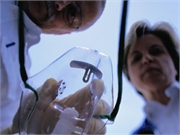MONDAY, Feb. 10, 2020 (HealthDay News) — Women who receive general anesthesia during a cesarean section delivery are at higher risk of severe postpartum depression that requires hospitalization, as well as self-inflicted harm and suicidal thoughts, a new study finds.
Researchers from Columbia University analyzed more than 428,000 discharge records of women who delivered by C-section in New York state hospitals between 2006 and 2013. Eight percent had general anesthesia.
In all, 1,158 women (3%) had to be hospitalized for severe postpartum depression. Of those, 60% were diagnosed at readmission, about 164 days after their initial discharge.
Compared with local anesthesia, general anesthesia was associated with a 54% increased odds of postpartum depression, and a 91% higher risk of suicidal thoughts or self-inflicted injury. The study only found an observation rather than a cause-and-effect link.
“General anesthesia for cesarean delivery may increase the risk of postpartum depression because it delays the initiation of mother to infant skin-to-skin interaction and breastfeeding, and often results in more acute and persistent postpartum pain,” study first author Dr. Jean Guglielminotti said in a university news release.
“These situations are often coupled with a new mother’s dissatisfaction with anesthesia in general, and can lead to negative mental health outcomes,” he added. Guglielminotti is an assistant professor of anesthesiology at Columbia’s Mailman School of Public Health in New York City.
General anesthesia can hasten delivery in an emergency, but he said there is no evidence that it improves outcomes for the baby and there is increasing evidence that it may have serious consequences for mothers.
“Our findings underscore the need to avoid using general anesthesia for cesarean delivery whenever possible, and to provide mental health screening, counseling and other follow-up services to obstetric patients exposed to general anesthesia,” said study co-author Dr. Guohua Li, a professor of epidemiology and anesthesiology.
The study was recently published online in the journal Anesthesia and Analgesia.
Postpartum depression has increased sevenfold in the United States over the past 15 years, to about 550,000 new cases a year. It now affects as many as 1 in 7 new mothers, the researchers said.
More information
The U.S. National Institute of Mental Health has more on postpartum depression.
Copyright © 2026 HealthDay. All rights reserved.

